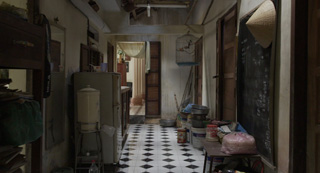A House in Ninh Hoa
Ein Haus in Ninh Hoa GERMANY / 2016 / Vietnamese / Color / DCP / 108 min
GERMANY / 2016 / Vietnamese / Color / DCP / 108 min
Director, Photography, Editing: Philip Widmann
Script: Philip Widmann, Nguyễn Phương-Đan
Realization: Nguyễn Phương-Đan
Sound: Karsten Krause
Sound Design: Volker Zeigermann, Simon Bastian
Producers, Dramaturgy: Merle Kröger, Philip Scheffner
Production Company, Source: pong film GmbH
Tightly shut windows, a deserted corridor, and unused furniture. This house in Ninh Hoa, in southern Vietnam, still holds the memory of the family that once used to live here, but has since been sundered by the Vietnam War. In fact there are two houses: one where a serene daily life marks time, as work continues in the rice paddies to the cooing of birds. And there is another, new house, as well. As if the spirits of the dead have been summoned, this family split between Germany and Vietnam is reunited at the two houses for the first time in a long time, and tries to gather fragments of the missing from old letters and photos, and through communication with spirits via a medium. A family tale spun from the collective memories of three generations.
[Director’s Statement] A House in Ninh Hoa shows a history of migration from the perspective of those who remained at home. Just like the vantage point, our constellation as author team is special: As a foreign body in the family ensemble, and likewise as a representative of the other life of their German relatives, together with Nguyễn Phương-Đan I cast a glance at the fragile transnational coexistence of his extended family. Not any less helpless than during my first visit in 2005, as I need constant language translation, but also as translator into the language of cinema.
With A House in Ninh Hoa, we are attempting a form of staging involving non-actors as an experimental approach in a documentary field: Together with the protagonists, we define the dramaturgy and framework of content, within which everyday life will be improvised in front of the camera. This makes it possible to extract the crux of everyday life and thereby also gradually bring the unvoiced or the implied parts of the family’s history into a comprehensible form. Necessarily, we forgo the peaks of dramaturgy—history rarely produces distinct waves on the water surface of family life. In the family house, time appears to be cyclical, hardly anything suggests a directedness towards the past or the future.
The different forms of speech—daily dialogue, letters from another time, the written report of the quiet patriarch Tiếp, telephone conversations, and the official-socialist diction of the village radio—connect to a fragmented narration that deals with the evocative power of widely separated times, places and associated persons: 1975 and 2014, Ninh Hoa and Bonn, Vietnam and Germany, the world of the living and the world of the dead. Part of the trajectory of this potency: airplanes, mopeds, trains, letters, photographs, telephone calls, sacrificial offerings, dreams of and dialogue with the dead.
 Philip Widmann
Philip WidmannBorn in 1980 in West Berlin, Widmann graduated in Cultural Anthropology from the University of Hamburg, and in Visual Communications from the University of Fine Arts Hamburg. Since 2016 he has been a member of the research training group The Photographic Dispositif at the Braunschweig University of Art. His film and video works have been shown in art spaces and film festivals around the world; among them the Wexner Center for the Arts, WRO Media Art Biennale Wroclaw, the Berlinale, the International Film Festival Rotterdam, the New York Film Festival, Mostra Internacional de Cinema em São Paulo, FID Marseille, CPH:DOX, and Visions du Réel. Between 2014 and 2016, Widmann was artist-in-residence at Akademie Schloss Solitude Stuttgart; Villa Kamogawa Kyoto; the Srishti Institute for Art, Design and Technology; the Goethe-Institut Bangalore; and Atelier 105 / Light Cone Paris.
